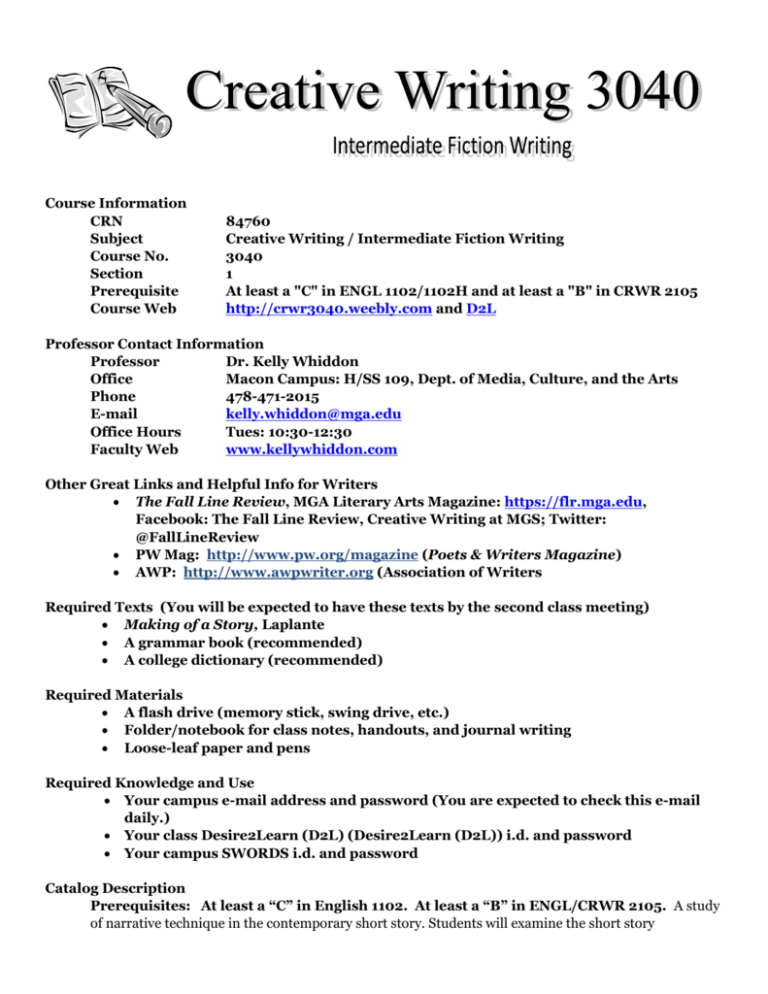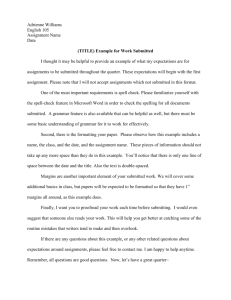Intermediate Syllabus
advertisement

Course Information CRN Subject Course No. Section Prerequisite Course Web 84760 Creative Writing / Intermediate Fiction Writing 3040 1 At least a "C" in ENGL 1102/1102H and at least a "B" in CRWR 2105 http://crwr3040.weebly.com and D2L Professor Contact Information Professor Dr. Kelly Whiddon Office Macon Campus: H/SS 109, Dept. of Media, Culture, and the Arts Phone 478-471-2015 E-mail kelly.whiddon@mga.edu Office Hours Tues: 10:30-12:30 Faculty Web www.kellywhiddon.com Other Great Links and Helpful Info for Writers The Fall Line Review, MGA Literary Arts Magazine: https://flr.mga.edu, Facebook: The Fall Line Review, Creative Writing at MGS; Twitter: @FallLineReview PW Mag: http://www.pw.org/magazine (Poets & Writers Magazine) AWP: http://www.awpwriter.org (Association of Writers Required Texts (You will be expected to have these texts by the second class meeting) Making of a Story, Laplante A grammar book (recommended) A college dictionary (recommended) Required Materials A flash drive (memory stick, swing drive, etc.) Folder/notebook for class notes, handouts, and journal writing Loose-leaf paper and pens Required Knowledge and Use Your campus e-mail address and password (You are expected to check this e-mail daily.) Your class Desire2Learn (D2L) (Desire2Learn (D2L)) i.d. and password Your campus SWORDS i.d. and password Catalog Description Prerequisites: At least a “C” in English 1102. At least a “B” in ENGL/CRWR 2105. A study of narrative technique in the contemporary short story. Students will examine the short story using models from classic and/or contemporary fiction writers, and they will produce their own work. In workshop format, they will critique each other's prose in class. Specifically . . . Students will work on their own fiction techniques by keeping a journal, completing daily writing exercises, writing and revising two short stories, and critiquing their peers’ work. Students will go beyond the introduction to fiction they received in English/Creative Writing 2105 and will examine the short story using models from classic and contemporary fiction writers. Syllabus Read and reread this syllabus thoroughly. This sheet is your key to class, and most of your questions will be answered here. You should know the rules and regulations of every class you attend early on so that you can stay focused, start off on the right foot, and know if this class isn’t the right class for you (before drop/add ends). If you don’t fully understand aspects of the policies, procedures, grading system, etc., don't hesitate to ask questions. Now is the time to do so. Assignments You will be expected to keep up with your own average throughout the semester. Below is a list of the assignments and the percentages of each. Counted toward your final grade will be two short stories, a revision of one of these stories, and and participation (the average of your oral contribution in workshops, your peer critiques, journals, and quizzes). The stories, revision, and critiques must be typed, and they must be in the correct format (given with the assignment). A paper that does not adhere to the mechanical specifications and/or instructions for the particular assignment may receive a zero. I will not take computer problems as an excuse for incorrect formatting. You should complete and print out your work far enough ahead of time that any technical problems you might have can be fixed before you turn it in. Computers are available in the library. 1. 2. 3. 4. Participation Short Story 1 Short Story 2 Revision 20 % 20 % 25 % 35 % Your major assignments are due at the time specified on the assignment sheet. An assignment turned in after the time deadline but before midnight of the due date will have five points deducted. A workshop assignment that is turned in after the deadline without prior permission or a documented emergency (hospitalization or worse) will not be accepted. The student will receive a 0 for that assignment. A final assignment that is turned in after midnight on the due date will receive ten points off per late day, up to four days late, after which, it will not be accepted. Having problems with a computer is not a valid excuse for not turning in your assignment on time. You should have a flash drive so that you can back up your work. Also, you should type your assignment far enough ahead of time that if you do forget to save it, you should have time to retype it. Being sick is also not an excuse. If you absolutely cannot come to class on a due date or a workshop date, you should still submit your work through D2L. Repeatedly missing peer workshops means you are not adequately contributing oral critiques of your peers’ work and could negatively affect your participation grade. Participation—20% Your participation is expected in this class. I will determine this grade by averaging the following: Peer Critiques—The majority of your participation grade will consist of written peer critiques of your peers’ stories. For the peer workshops, you will be required to read the stories of specified students online on Desire2Learn (D2L) and submit written critiques on Desire2Learn (D2L), as well as bring copies of those written critiques to class to help you communicate your insights. Class Discussion—You will be expected to take part in class discussion. Not doing so will negatively affect your participation grade. Peer Workshop Oral Contribution—Your writing will often be reviewed by a peer group. (You should not submit an assignment that you do not feel comfortable sharing with your classmates). You will read your peers’ stories and write critiques of these stories (see “Peer Critiques” above). Your assignment on the day of a scheduled peer workshop will be to communicate these insights orally to the class and to the peer. Though you are not given a quantifiable grade for this oral contribution, it is expected of you, and if, at the end of the semester, I feel that you did not adequately participate in class discussion during workshops, points will be deducted from your participation grade. Pop Quizzes—To check that you are keeping up with your reading assignments, I may give you pop quizzes from time to time. The pop quizzes generally include five questions. They may be online or in class. If in class, and you are absent on the day of a pop quiz (unexcused), you will receive a zero. However, I will drop the lowest pop quiz grade at the end of the semester. Daily Assignments/Journal Entries/Responses to Readings: Since you are now at the intermediate stage of fiction writing, it is extremely important that you develop a writing habit, meaning you should have a time and place that you write daily. To help you nurture this habit, you may be given journal assignments on Weebly or Desire2Learn (D2L). You can also expect to do informal writing often as a classroom assignment. These assignments are meant to help with your creativity, so you should not feel hindered by grammatical rules in this arena. You will be expected to have daily assignments at the time specified when the assignment is given. For inclass writing, I may take the assignments up or I may grade these assignments by having you read them in class. If I call on you, and you do not have your assignment, or you will not read it, you will have a 0 averaged into your participation grade. If your response shows disrespect for the assignment, you will have a 50 averaged into your participation grade, and a 100 will be averaged in if you adequately complete and read the entry. IMPORTANT: Sharing your writing, comments, questions, answers, etc. aloud with the rest of the class when asked is a requirement. There is no reason to feel shy or embarrassed since all others will contribute as well. Short Stories—45% (20% for Short Story 1 and 25% for Short Story 2) You will be required to write two short stories, revising one of them. More information will be forthcoming. Revision—35% After both of your stories have been peer critiqued and graded, you will choose one to revise, and this assignment, like a final, is meant to represent the culmination of all you have learned in the class, so you will want to radically revise, do your absolute best work, and not just turn in what you have (largely) already written. Conferences with me will help to guide you in the right direction. Grading These are the numerical equivalents for the letter grades you will receive in this class: A+ = 98, A = 95, A- = 92, B+ = 88, B = 85, B- = 82, C+ = 78, C = 75, D+ = 68, D = 65, D- = 62, F = 55 . If your work receives below a "55," I will put the exact numerical grade on your paper. Assignments submitted in class will be returned to you in class; ones submitted on Desire2Learn (D2L) will receive grades and comments on Desire2Learn (D2L). You will receive your final grade in the class only through SWORDS. Grammar Even though this is a creative writing class, you will still be expected to use correct grammar and punctuation (There is some leniency if you are writing in the voice of a character who uses incorrect grammar, but, it should be clear that your failure to adhere to traditional grammar rules is intentional and serving a purpose). You will be expected to delve into any grammar topics you do not understand by using a grammar book. You may also get outside help from me or a tutor (the SSC (formerly the ARC) provides free tutoring to all students). There should be no excuse for continually making the same unintentional grammar errors on your assignments. Attendance Since your participation and involvement are important components of this course, your attendance is required. Of course, you are responsible for any work missed when you are absent. You will be allowed four absences in this course. However, after these three, you will receive ten points off of your final average for each additional absence. Therefore, anyone who misses eight classes or more, for whatever reason, will fail the course, those with a B average who also miss seven classes or more will fail the course, those with a C average who also miss six classes or more will fail the course, and those with a D average who also miss five classes will fail the course. This rule applies to “excused” absences as well (absences for which a doctor’s excuse or documentation of a death in the immediate family is supplied). In other words, excused absences count toward the total tally of absences; however, students with excused absences may be able to make up work that is missed on those days. Keeping Up—You should get the email addresses (or phone numbers) of two people in the class so that if you are absent, you can email these people to find out what you missed. You will also have access to the other students in the class via Desire2Learn (D2L). Some assignments may be posted on D2L, and, if so, you can do them at home. Note: If you are absent, you will still be expected to have any other (non-D2L) daily and homework assignments from the day(s) before on the day you come back. This rule applies only to non-D2L daily and homework assignments. All other assignments are due (or occur) on a specific day with no exceptions. Find two people in the room you would not mind contacting if you were absent and write down their names and emails (and possibly telephone numbers or Twitter ids) in a place that you will keep close to you. It is your responsibility to keep up with the class when you are absent. Tardiness If you arrive after I have called your name on the roll, it is your responsibility to come up to me after class and remind me that you are present. I will then change your absence to an “L” (for late). Every three “L’s” counts as an absence. If you come in late and do not come up to me after class, you will likely receive an absence, and these marks cannot be challenged at a later date. Also, if you miss over twenty minutes of class (beginning, middle, or end), you will be counted absent regardless of whether or not you are present for the rest of the class period. Student Conduct As a Middle Georgia State College student and as a student in this class, it is your responsibility to read, understand, and abide by the MGSC Student Code of Conduct. The Student Code of Conduct is included in the MGSC Student Handbook and is available online at: http://www.mga.edu/studentlife/studenthandbook.pdf Plagiarism Plagiarism--passing off another person's writing or ideas as your own without proper acknowledgement--is a serious offense. If you plagiarize in any of your assignments, you will fail the course and will be reported to the dean of students for further academic penalty (including possible dismissal from the college). Disability Accommodations Students seeking academic accommodations for a special need must contact the MGSC Counseling and Career Center (478-471-2714) located on the second floor of the Student Life Center on the Macon Campus.






